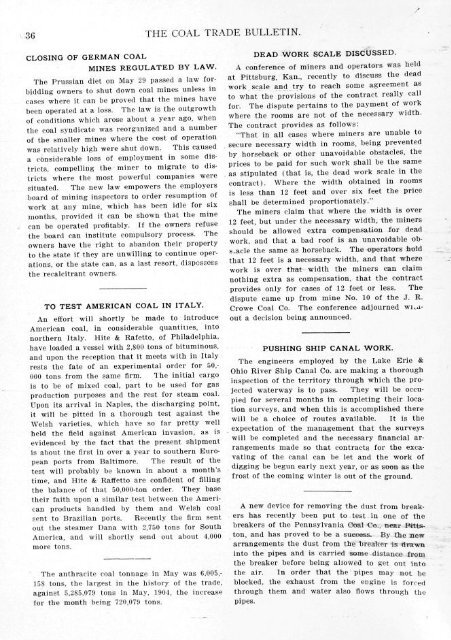COAL - Clpdigital.org
COAL - Clpdigital.org
COAL - Clpdigital.org
Create successful ePaper yourself
Turn your PDF publications into a flip-book with our unique Google optimized e-Paper software.
CLOSING OF GERMAN <strong>COAL</strong><br />
MINES REGULATED BY LAW.<br />
The Prussian diet on May 29 passed a law forbidding<br />
owners to shut down coal mines unless in<br />
cases where it can be proved that the mines have<br />
been operated at a loss. The law is the outgrowth<br />
of conditions which arose about a year ago, when<br />
the coal syndicate was re<strong>org</strong>anized and a number<br />
of the smaller mines where the cost of operation<br />
was relatively high were shut down. This caused<br />
a considerable loss of employment in some districts,<br />
compelling the miner to migrate to districts<br />
where the most powerful companies were<br />
situated. The new law empowers the employers<br />
board of mining inspectors to order resumption of<br />
work at any mine, which has been idle for six<br />
months, provided it can be shown that the mine<br />
can be operated profitably. If the owners refuse<br />
the board can institute compulsory process. The<br />
owners have the right to abandon their property<br />
to the state if they are unwilling to continue operations,<br />
or the state can, as a last resort, dispossess<br />
the recalcitrant owners.<br />
TO TEST AMERICAN <strong>COAL</strong> IN ITALY.<br />
THE <strong>COAL</strong> TRADE BULLETIN.<br />
An effort will shortly be made to introduce<br />
American coal, in considerable quantities, into<br />
northern Italy. Hite & Rafetto, of Philadelphia,<br />
have loaded a vessel with 2,800 tons of bituminous,<br />
and upon the reception that it meets with in Italy<br />
rests the fate of an experimental order for 50,-<br />
000 tons from the same firm. The initial cargo<br />
is to be of mixed coal, part to be used for gas<br />
production purposes and the rest for steam coal.<br />
Upon its arrival in Naples, the discharging point,<br />
it will be pitted in a thorough test against the<br />
Welsh varieties, which have so far pretty well<br />
held the field against American invasion, as is<br />
evidenced by the fact that the present shipment<br />
is about the first in over a year to southern European<br />
ports from Baltimore. The result of the<br />
test will probably be known in about a month's<br />
time, and Hite & Raffetto are confident of filling<br />
the balance of that 50,000-ton order. They base<br />
their faith upon a similar test between the American<br />
products handled by them and Welsh coal<br />
sent to Brazilian ports. Recently the firm sent<br />
out the steamer Dana with 2,750 tons for South<br />
America, and will shortly send out about 4,000<br />
more tons.<br />
The anthracite coal tonnage in May was 6,005,-<br />
158 tons, the largest in the history of the trade,<br />
against 5,285,079 tons in May, 1904, the increase<br />
for the month being 720,079 tons.<br />
DEAD WORK SCALE DISCUSSED.<br />
A conference of miners and operators was held<br />
at Pittsburg, Kan., recently to discuss the dead<br />
work scale and try to reach some agreement as<br />
to what the provisions of the contract really call<br />
for. The dispute pertains to the payment of work<br />
where the rooms are not of the necessary width.<br />
The contract provides as follows:<br />
"That in all cases where miners are unable to<br />
secure necessary width in rooms, being prevented<br />
by horseback or other unavoidable obstacles, the<br />
prices to be paid for such work shall be the same<br />
as stipulated (that is, the dead work scale in the<br />
contract). Where the width obtained in rooms<br />
is less than 12 feet and over six feet the price<br />
shall be determined proportionately."<br />
The miners claim that where the width is over<br />
12 feet, but under the necessary width, the miners<br />
should be allowed extra compensation for dead<br />
work, and that a bad roof is an unavoidable obstacle<br />
the same as horseback. The operators hold<br />
that 12 feet is a necessary width, and that where<br />
work is over that- width the miners can claim<br />
nothing extra as compensation, that the contract<br />
provides only for cases of 12 feet or less. The<br />
dispute came up from mine No. 10 of the J. R.<br />
Crowe Coal Co. The conference adjourned wuout<br />
a decision being announced.<br />
PUSHING SHIP CANAL WORK.<br />
The engineers employed by the Lake Erie &<br />
Ohio River Ship Canal Co. are making a thorough<br />
inspection of the territory through which the projected<br />
waterway is to pass. They will be occupied<br />
for several months in completing their location<br />
surveys, and when this is accomplished there<br />
will be a choice of routes available. It is the<br />
expectation of the management that the surveys<br />
will be completed and the necessary financial arrangements<br />
made so that contracts for the excavating<br />
of the canal can be let and the work of<br />
digging be begun early next year, or as soon as the<br />
frost of the coming winter is out of the ground.<br />
A new device for removing the dust from breakers<br />
has recently been put to test in one of the<br />
breakers of the Pennsylvania Coal Co., near Pittston,<br />
and has proved to be a sueoess. By the new<br />
arrangements the dust from the breaker is drawn<br />
into the pipes and is carried some distance from<br />
the breaker before being allowed to get out into<br />
the air. In order that the pipes may not be<br />
blocked, the exhaust from the engine is forced<br />
through them and water also flows through the<br />
pipes.
















